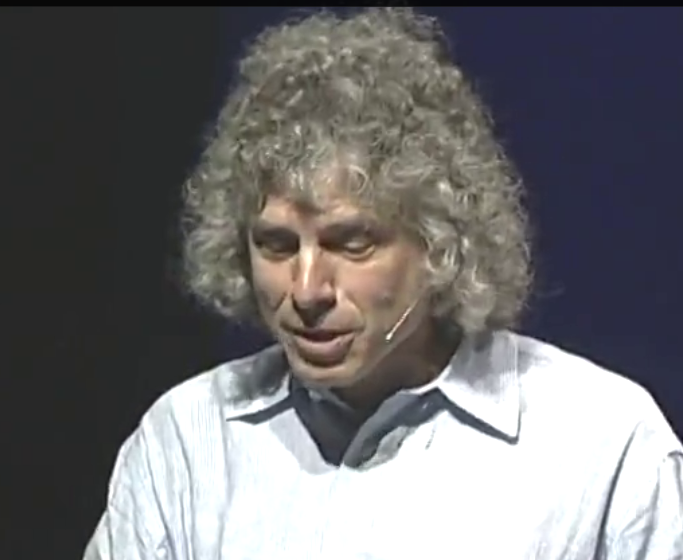(单词翻译:单击)
演讲文本
Now, many events can be subject to either construal,
许多时候我们都有理解偏差
kind of like the classic figure-ground reversal illusions,
类似于经典的“形象-背景”颠倒的幻术
in which you can either pay attention to the particular object,
你要么吧注意力放在某个物体上
in which case the space around it recedes from attention,
使周围的空间从注意力中退去
or you can see the faces in the empty space, in which case the object recedes out of consciousness.
要么你集中注意观察空间的构造,这样前景中的物体就从意识中退去
How are these construals reflected in language?
这些理解如何反应在语言当中?
Well, in both cases, the thing that is construed as being affected is expressed as the direct object, the noun after the verb.
在两种情况里,那个被解释为受影响的东西被表达成了直接宾语:动词之后的名词。

So, when you think of the event as causing the muffin to go somewhere --
当你想到“使蛋糕去某处”时
where you're doing something to the muffin -- you say, "Give the muffin to the mouse."
当你对蛋糕实施动作时,你说:“Give the muffin to the mouse.”
When you construe it as "cause the mouse to have something," you're doing something to the mouse,
当你理解成“使老鼠拥有某物”,你对老鼠实施动作
and therefore you express it as, "Give the mouse the muffin."
所以你把它表达成:“Give the mouse the muffin.”
So which verbs go in which construction -- the problem with which I began --
所以,在哪个构式里用哪个动词,我一开始提出的问题
depends on whether the verb specifies a kind of motion or a kind of possession change.
取决于动词是否指出某种运动,或者某种所有权的变化
To give something involves both causing something to go and causing someone to have.
"给出某物“当中包含"使某物前往",也包含”使某人拥有“
To drive the car only causes something to go, because Chicago's not the kind of thing that can possess something.
开车只能使某物走开,因为芝加哥不是那种能拥有某物的东西。
Only humans can possess things.
只有人才能拥有东西。
And to give someone a headache causes them to have the headache,
“令人头痛”使人具有头痛
but it's not as if you're taking the headache out of your head
但你并不会把头痛从手里给出去
and causing it to go to the other person, and implanting it in them.
让它到另一个人那里去,然后再放进对方脑袋里。
You may just be loud or obnoxious, or some other way causing them to have the headache.
你只可能是说话太大声,或者讨人厌,或者用其他的方法使对方头疼。
So, that's an example of the kind of thing that I do in my day job.
所以,这是我工作内容的一个例子。
视频及简介
演讲简介:
在他所著《思想的实质》的独家新书介绍会上,史蒂芬·平克探讨了语言如何表达内心的思想--以及我们的遣词用句中透露出多少鲜为人知的信息。


